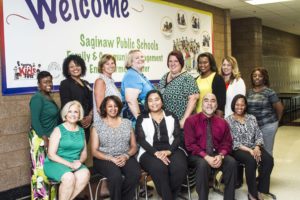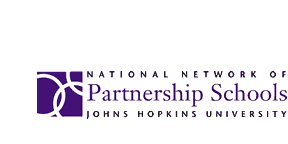Saginaw, Michigan

Row 2 (L to R): Chirila Hamilton, Keva Clark, Christine Klein, Rebecca Wilkins, Amanda Kitterman-Miller, Martha Fordham, Jennifer Nichols, Delores Giles
Family Engagement Empowerment Day (F.E.E.D.)
District leaders for partnerships in Saginaw observed that some schools needed to improve their partnership programs with better marketing, and by linking family and community engagement activities to goals for student learning. The district leaders modeled a welcoming activity on Family Engagement Empowerment Day (FEED). They used the NNPS Framework of Six Types of Involvement to show how activities could support school improvement goals, including academic achievement, behavior, school climate, and the general goal of strengthening family and community engagement.
Focus groups with diverse families helped the district leaders plan FEED by identifying topics for sessions and services they needed. At FEED, parents could visit up to 45 community agencies and groups that distributed resources about their services. Community participants included local colleges, financial institutions, human service agencies, behavioral and mental health, youth development, health and wellness, faith based organizations, counseling services, academic support groups, and others. Breakout sessions were conducted hourly from noon to 5 p.m. on such topics as STEM, literacy, multicultural competencies, college and career readiness, and family engagement.
Family Engagement Empowerment Day (F.E.E.D.) is featured in Promising Partnership Practices 2017.
Cluster Busters: Keep ATPs Engaged with Engagement
Family and community engagement is an official priority goal in Saginaw Public Schools. The district leader for partnerships is working with 16 schools’ ATPs. She conducts cluster meetings at least twice each semester to help teams network with each other. At these meetings, the ATPs share good ideas, solve challenges, and receive technical assistance from the Family Engagement Specialist. The honest and open exchanges identify what is working well and where there are problems to solve in the various schools. The meetings are characterized by conversations about goal-linked family and community engagement and topics on which the district leader may conduct training workshops to assist the ATPs.
The Family Engagement Specialist visits each school, talks with the ATP chairs or co-chairs, principal, parent liaison, and others. These visits focus on the unique aspects of each school and how leaders want to continue to improve family and community engagement for student success. The leader for partnerships also speaks to the district’s Administrator Council Meeting. There, she addresses all principals at the same time about how her office can assist their schools’ ATPs and their goals for good partnerships, and how they—as principals—may support that agenda. Topics include how principals (who are on the ATP) can follow up actions after an ATP meeting, ensure that a budget is allocated for partnership activities, obtain support from community partners, and monitor the school’s progress on family engagement.
Cluster Busters: Keep ATPs Engaged with Engagement is featured in Promising Partnership Practices 2017.

